Nigeria
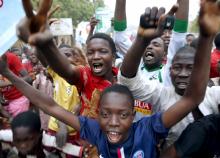
A northern Nigeria Muslim leader who promised to pursue a nonreligious agenda as president will now have to deal with an Islamic terrorist insurgency that has wreaked chaos in the country’s north.
Muhammadu Buhari, 72, a former military ruler and a Muslim, beat incumbent Goodluck Jonathan, 57, a Christian from the country’s south, in a race held under the shadow of Boko Haram violence.
Not all Nigerians are happy with Buhari’s election, given his past human-rights record as president from January 1984 to August 1985. During that time, he imprisoned journalists and opposition activists without trial and executed drug traffickers by firing squad.
But Nigerians, both Christian and Muslim, hope he is better-suited to battle Boko Haram, despite being a Muslim himself.
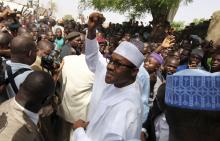
Under the shadow of Boko Haram violence, Nigerians head to the polls March 28 to elect a president and a deputy in a vote observers say is critical for the country’s stability and economic progress.
In a twist that might have been difficult to predict, many Christians in Nigeria’s north are backing a Muslim candidate to lead their country away from the brink of violence and chaos.
Muhammadu Buhari, a Muslim from the north and the leader of the All Progressives Congress party, is challenging the leadership of incumbent President Goodluck Jonathan, a Christian from the south who heads the ruling People’s Democratic Party.
Some Nigerians fear that another term for Jonathan would mean institutionalization of corruption and emergence of more Muslim extremist groups in addition to Boko Haram.
And they are willing to pin their hopes on a Muslim candidate.
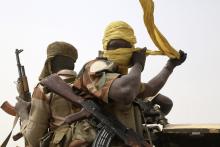
Boko Haram’s leader has pledged allegiance to the Islamic State in a new audio message, according to a group that monitors extremist activity.
In the recording, a man claiming to be Abubakar Shekau, leader of the Nigerian terrorist group that has killed thousands, vowed to follow Islamic State leader Abu Bakr al-Baghdadi, the U.S.-based SITE Intel Group, announced on March 7.
“We announce our allegiance to the Caliph of the Muslims … and will hear and obey in times of difficulty and prosperity, in hardship and ease, and to endure being discriminated against, and not to dispute about rule with those in power, except in case of evident infidelity regarding that which there is a proof from Allah,” Shekau said in a tweeted message that went along with the video, according to the Associated Press. Al-Baghdadi is the self-proclaimed head of the caliphate.
Flashpoint Intelligence, a global security firm, confirmed the recording to NBC News and said it was posted on Boko Haram social media accounts. USA Today was not able to independently verify the message.
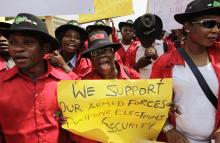
Nigeria’s election commission has postponed national elections for six weeks saying it would not be able to provide security for voters in the northeast region of the country most affected by the Islamist group Boko Haram.
Attahiru Jega, head of the Independent National Electoral Commission, announced Feb. 7 that the elections scheduled for Feb. 14 had been moved to March 28. Nigeria is slated to elect a president for a four-year term. Goodluck Jonathan, the current president and a Christian, is running for re-election alongside 13 other candidates, including his most formidable challenger, Muhammadu Buhari, a Muslim.
Jonathan has been sharply criticized for his management of the Boko Haram crisis and some Western leaders suggested the postponement was a last-ditch effort to shore up his vote.
But church leaders in the war-hit regions welcomed the move.
“Many Christians here had not collected their voter cards and this may afford them time to do so,” said the Rev. John Bakeni, the secretary of the Roman Catholic Diocese of Maiduguri.
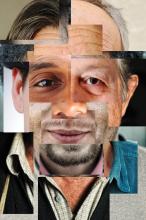
The real war on terror is not a war on Western values or American values. It is evil perpetuating crimes of power and control, and its costs are measured in real in human lives. Those lives are largely black and brown, and the focus on the danger to America with its resulting protectionism and cultural-centrism is endangering lives long term.
Church, let us not join in the narrative of self-preservation. Let us not value those who look and think like our own community more than those who are culturally different. Let us not value the wealthy more than the impoverished. Let justice-speech ring from our pulpits, and let love for the culturally different be reflected in our prayers and our financial endeavors. For the world to hear that in Christ all lives matter, we the Body must speak loudly and demonstrate that #blacklivesmatter #brownlivesmatter.

While a new Congress relentlessly pursued its ideological agenda to trim government and reward its big-money patrons, a vastly more complicated world intruded:
- In Maryland, a bishop reportedly driving drunk struck a bicyclist, fled the scene while he lay dying and, according to some reports, returned only after a church official told her she had to do so.
- In Paris, a handful of religious terrorists defended the Prophet Muhammad by slaughtering the staff of a satirical magazine.
- In Nigeria, the Islamic extremist group Boko Haram intensified its systematic massacring of Nigerian citizens.
- In New York City, police officers wanting more respect from the new mayor waged a childish campaign of disrespect against the mayor and against the people of New York.
- In Washington, the latest jobs report showed more jobs being created but no gains in pay. That means the lower and middle classes continue to be dragged down by up-with-wealth political actions.
All this in a week’s time, all while Congress was pursuing a stale ideological agenda dating back to the 1930s. In that agenda, legislators would gut Social Security (take that, FDR), reward big oil with a new pipeline (thanks for the patronage, Koch brothers), chip away at Affordable Care (gotcha, Barack) and appease social conservatives.
They would treat the world as a simple place where government must shrink, people must suffer and the precious few must get richer.
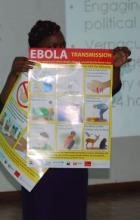
The government of Sierra Leone banned public Christmas and New Year’s celebrations because they may exacerbate efforts to eradicate the Ebola virus.
President Ernest Bai Koroma said that despite immense help from the international community, the number of people infected with the virus continues to rise.
Ebola infections in Sierra Leone recently surpassed those of Liberia and Guinea.
“The illness started at the border and now is in the cities and close to 2,000 people have died from the outbreak,” Koroma told reporters. He asked traditional leaders and tribal chiefs to quit performing rituals in hopes that will help curb Ebola.
The majority of Sierra Leone’s 6 million people are Muslim, but Christmas is widely celebrated among the 27 percent of people who are Christian.
Officials said soldiers will be deployed on the streets and people are advised to stay at home with their families.
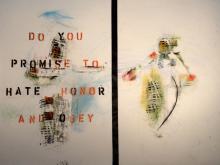
While the world’s attention is firmly fixed on the Islamic State’s continued rein of terror, applause for Malala Yousafzai — for taking home the Nobel Peace Prize — has taken on a quieter tone. Yet, her message — that girls can turn the tide against religious radicalism and repression — risks being lost.
In another part of the world, reports continue to trickle in of the failed negotiations between the Nigerian government and Boko Haram — negotiations that were supposed to include provisions for release of the more than 200 Nigerian schoolgirls who remain firmly within Boko Haram’s grip. In fact, there are new reports that another 20 to 70 women and girls have become the latest victims of Boko Haram’s terror, threatening the cease-fire that was to bring the original schoolgirls home. Moreover, much of the world is now eerily silent on the subject — calling into question the commitment to the return of the girls and undermining the separate campaign to improve the education of girls worldwide.
Is this Malala’s world? One where the value of female lives is an open question, and where the kidnapping of girls and women by terrorists goes unanswered? It certainly seems that way. The #bringbackourgirls campaign championed by first lady Michelle Obama and countless Hollywood stars is now a stagnant memory.
Compare this reality to the global push to educate the girls, an understood foundation for economic development and prosperity, with the paradox of the wholesale abandonment of the abducted girls, whose only crime was receiving this exact education.
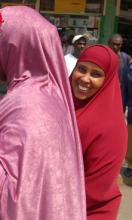
In northern Nigeria, mounting fears of militant female suicide bombers have raised calls to ban the hijab, or the veil that covers the head, chest and, in some cases, the entire body.
Last week, four women believed to be members of the Islamic militant group Boko Haram carried out attacks in Kano, a city in northern Nigeria. Men belonging to the group have taken to wearing the hijab, too, according to reports.
On July 27, a female suicide bomber detonated a bomb outside a Roman Catholic church in Kano, killing four people and injuring 70. Around the same time, security agencies arrested two girls aged 10 and 18 with explosive belts under their hijabs.
“We have this worrying situation where the bombers are turning out to be girls dressed in the hijab,” Roman Catholic Bishop John Niyiring of Kano said.
Banning the hijab is crucial to curbing the trend, said Emmanuel Akubor, a historian at Obafemi Awolowo University in Ile-Ife in western Nigeria.
“The best thing for now is to place a temporary ban on hijab, not for religious, but security reasons,” he told News Agency of Nigeria.
But Niyiring said he thinks such a ban would be resisted.

THE VIOLENCE AND kidnappings in Nigeria are more than a religious conflict: They are a political manipulation of religion.
Before the 2011 Nigerian election, northern politicians (who are mostly Muslims) threatened to make the country ungovernable if Goodluck Jonathan, a Christian from the south, became president. Jonathan was vice-president for Umaru Musa Yar’Adua, a Muslim from the north, who died before completing his eight-year term. Jonathan assumed power after Yar’Adua’s death, as is allowed by the constitution. However, northern Muslims claimed that since Yar’Adua did not finish his term, they should be allowed to place someone of their own choosing in power. Jonathan’s refusal angered the north.
In response, the Muslim terrorist organization Boko Haram began intensifying its attack on Jonathan’s rule in order to discredit his presidency and his pursuit of the 2015 election. If Boko Haram succeeds in pushing Jonathan out, southern militia groups are likely to commence their own violent campaign. These terrorists are trying to manipulate people by making them think that it is a religious fight, when in reality it is about political power.
People, however, are beginning to reject the violence. In April, as the world is well aware, Boko Haram kidnapped more than 200 schoolgirls from Chibok, a community that is said to be about 90 percent Christian. The outcry of rage and pain about this incident transcended religious lines. In a May market bombing in the city of Jos, both Christians and Muslims lost their lives. After the bombings, Muslims and Christians on the streets of Jos tried to work together in finding a way through the situation. People no longer want to fight and are starting to value peacebuilding and interfaith efforts. This is a sign of hope.

Can you imagine sitting in a public space and all of a sudden everyone around you starts to speak in a different language? And yet somehow you still understand them? Can you imagine the cacophony of sounds this event would cause? Can you envision the power it would take to make this astonishing moment happen?
Is it a miracle? Possession? Paranormal activity? It likely would freak you out.
This moment actually happens more often than we think. A glimpse of this cacophony of sounds can be found in our everyday lives. We hear loud voices coming through network and cable news shows, on Twitter and Facebook, and through other social media outlets. We hear rising decibels of chatter around social justice issues — from the right and from the left — about issues as diverse as abortion, same-sex marriage, income inequality, biblical obedience, or defining traditional values. We hear the noise. At times, it is almost deafening. The voices seem to fly past each other so fast that neither side seems to be listening to the other at all.
But then there are moments when we all come together to speak for one common purpose.
The recent focus on the kidnapped girls in Nigeria shines a light on the suffering of women and girls all around the world.
Perhaps it is due to my ongoing fascination with Jewish and Christian apocalypses that the motif of suffering is constantly on my mind. I am always struck with John the Seer’s words of praise and encouragement in his letters to the seven churches of the Apocalypse that are patiently enduring persecution, affliction, distress, and tribulation.
It seems that from a Christian perspective, suffering is to be expected and just part of the deal of Christian membership — a real scriptural blow to prosperity gospels! Thus it should come as no surprise to us when the letter of 1 Peter 4:12-14 and 5:6-11 emphasizes the same themes of present suffering as a marker for future reward.
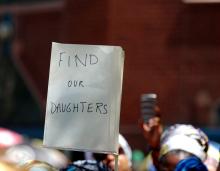
The brutal abduction of several hundred Nigerian schoolgirls has stunned and outraged the world. A violent organization called Boko Haram, and its leader Abubakar Shekau, took credit for the kidnapping more than 300 female students from their classrooms at gunpoint, from a government-run school in Chibok, on April 14. In his subsequent video, the smiling terrorist leader told the world they would sell the teenage girls “into the marketplace” or forced marriages; in his latest, he claims the girls have converted to Islam. Shekau has claimed that God told him to do all of this. That is a lie. It is an abomination. It is a blasphemy against God, and people of faith from all traditions should denounce his words.
Invoking the name of God to justify human barbarity is a painfully tragic and an ongoing occurrence. If hearing these lies about God breaks our hearts, we can only imagine they must also break the heart of God. As the Qur’an warns, “Who is more unjust than he who lies against God?” This kind of blasphemy often derives from extreme religious fanaticism that can be found in all of our faith traditions — those who pervert, abuse, and use the language of religion for fear, hate, and power. These self-proclaimed religious leaders must be utterly denounced as false and human abominations of religion and must be publically condemned and held accountable by faith communities around the world.
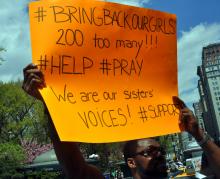
On April 15, terrorists from Boko Haram abducted more than 200 Nigerian girls sleeping in their high school dormitory. The girls awoke to a nightmare of violent gunfire as the terrorists forced them into their vehicles and vanished.
Recently the leader of Boko Haram has garnered media attention with his video arrogantly taking credit for the kidnapping. He added a religious element to his repulsive actions:
“I abducted your girls. I will sell them in the market, by Allah. There is a market for selling humans. Allah says I should sell. He commands me to sell. I will sell women.”
Omid Safi, professor of Islamic Studies at the University of North Carolina at Chapel Hill, wrote an impassioned response to Boko Haram’s leader that speaks for me: “Human beings are not for sale…This is the bastardization of Islam, of decency, of liberation, of all that is good and beautiful.”
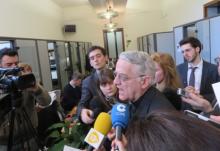
The Vatican issued an urgent appeal Thursday for the release of more than 200 Nigerian schoolgirls kidnapped by the Islamist militant group Boko Haram.
“The denial of any kind of respect for life and for the dignity of human beings, even the most innocent, vulnerable and defenseless, calls for the strongest condemnation,” Lombardi said.
He added that the kidnappings aroused the most heartfelt feelings of compassion for the victims and a sense of horror for the physical and spiritual suffering and the incredible humiliation they have suffered.
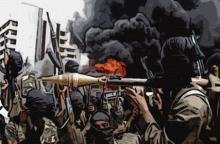
Boko Haram is among the most vicious terrorist groups operating in North Africa, home to some of the worst Islamist extremists in the world.
The group was begun in 2002 by Mohammed Yusuf, a cleric whose aim is an Islamic state in Nigeria. He was killed in 2009. The group’s current leader, Abubakar Shekau, surfaces sporadically in videotaped messages.
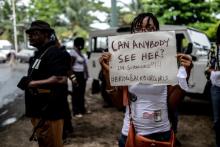
The first time I heard the news about the 270 Nigerian school girls who had been kidnapped by Boko Haram was last Sunday. I was sitting with the rest of the band at St. Augustine's Catholic Parish during worship. Fr. Gabriel, a priest from Nigeria, was preaching. In his sermon, he offered a litany of events, incredibly difficult events that had transpired in the preceding week as examples of how God does indeed respond when we are in our darkest moments. No matter how we may doubt, fear, or struggle, Jesus will walk through walls to get to us.
All the other events he listed I had heard of. There had been media coverage. People had been given the opportunity to respond to the needs of others.
The girls were kidnapped by Boko Haram on April 14. I had not heard the news until April 27. And it still wasn’t in the papers.
This week I heard the words of Cleopas, “Are you the only stranger in Jerusalem who does not know the things that have taken place there these days?”
So, like the stranger in our story, I asked, “what things?”
According to reports in The Guardian and Smithsonian Magazine 's website , the girls are being sold as brides across the border in Cameroon and Chad for the equivalent of $12 each. This means, of course, that the girls are being sexually assaulted.
Boko Haram is a loosely knit organization. There appears to be no specific hierarchy, only the desire to carve out of Nigerian territory a so-called "pure" Islamic state. Their vision is beyond radical. Violence against other Muslims is not uncommon. They target churches and mosques with the same viciousness. This time they targeted the last school left in the region. They targeted the girls. Translated, Boko Haram means "western education is sinful." To educate girls, then, is a form of Western education. To educate girls is a sin. To sell them across the border is not.
And they need women. They need brides. The girls are being sold. Sold.
Christians began a three-day prayer and fasting period after Islamist Boko Haram militants kidnapped hundreds of schoolgirls in Nigeria and desperate parents joined the search in a remote forest.
The girls were abducted last week while at school in the Chibok area of Borno State. Initial reports said about 200 were kidnapped, but government officials lowered the figure to 130. On Monday, school officials said 234 were abducted and 40 girls had managed to escape.
“We know no religion [that] prescribes abduction or infliction of pain as a way of devotion,” said the Rev. Titus Pona, an official with the Christian Association of Nigeria. “We are calling on them to sheathe their arms and pursue their case in dialogue with the government.”
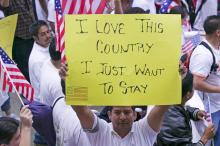
Imagine a young girl growing up in a small town going off to college then law school. She then takes the bar examination and becomes a licensed attorney. She has accomplished what most people would call the American Dream.
However, one thing is missing — her father. You see, her father was deported when she was three years old and they have been separated ever since. She has lived 30 years without him.
Her father came to this country from Nigeria. He saw America as the land of opportunity. Her mother tells her that before coming to America he believed the streets were paved with gold. I’m not sure if his statement was figurative or literal, but I do know that he saw it as a wonderful opportunity.
Her father came to this country as a student on a student visa. He was able to obtain a bachelor’s and a master’s degree. He worked hard in school and earned both degrees. He longed to begin his career as an architect in America. He desperately wanted his piece of the American Dream.